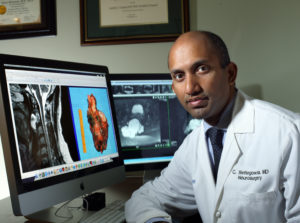Chetan Bettegowda
 CHETAN BETTEGOWDA attended Duke University as a Benjamin N. Duke Scholar, where he graduated with a double major in Biology and Religion. He went on to complete his MD and PhD degree in Cellular and Molecular Medicine at the Johns Hopkins University School of Medicine, in the laboratory of Drs. Bert Vogelstein and Ken Kinzler. After finishing the MD/PhD program, Dr. Bettegowda completed his neurosurgery training at the Johns Hopkins Hospital. While a resident, he returned to the Vogelstein/Kinzler lab to finish a post-doctoral fellowship.
CHETAN BETTEGOWDA attended Duke University as a Benjamin N. Duke Scholar, where he graduated with a double major in Biology and Religion. He went on to complete his MD and PhD degree in Cellular and Molecular Medicine at the Johns Hopkins University School of Medicine, in the laboratory of Drs. Bert Vogelstein and Ken Kinzler. After finishing the MD/PhD program, Dr. Bettegowda completed his neurosurgery training at the Johns Hopkins Hospital. While a resident, he returned to the Vogelstein/Kinzler lab to finish a post-doctoral fellowship.
During his career as a clinician/scientist, Dr. Bettegowda has garnered numerous accolades including being inducted into Alpha Omega Alpha honor society, winning the Sherman Award for Neurosurgery Achievement, the Helen B. Taussig Award at the Johns Hopkins Young Investigator’s Day Award, the David Klein Award from the American Association of Neurological Surgeons, the Richard Ross Clinician Scientist Award, the Sanford Larson Award from the American Association of Neurological Surgeons and Rienhoff Scholar’s Award. Most recently he was part of the team of scientists awarded the American Association of Cancer Researchers “Team Science Award”, where he and his colleagues were recognized for the development of liquid biopsy approaches in cancer. He has published in such journals as Science, Nature Genetics, Proceedings of the National Academy of Sciences and Science Translational Medicine.
Dr. Bettegowda is currently an Associate Professor in the Department of Neurosurgery and Oncology at the Johns Hopkins University School of Medicine. His clinical focus is on the surgical management of brain and spine tumors, while studying the molecular events that cause them to arise in the laboratory. In particular, his current research is focused on translating our genetic understanding of tumors for diagnostic benefit. As a member of the Ludwig Center for Cancer Genetics, his efforts have focused on the applications of cell free tumor derived DNA for the early detection and monitoring of a myriad of cancers. His research is funded by the Burroughs Wellcome Career Award for Medical Scientists, Doris Duke Clinician Scientist Award, Department of Defense, and the National Cancer Institute.